10% OFF Judogi! (Until April 30th, 2pm JPT).

-
Cherry Blossom Special Offer 2025 | -
Merge KuSakura International x France | -
New Products & Navigation Menu Rework | New Products Now Available Online & New Shopping Menu! -
Review Reward Campaign | Leave a comment on your recent purchase and receive a 5% discount.
How to choose your Japanese Embroidery
Japanese Style Embroidery on Martial Arts Equipement
Having one's name embroidered or engraved on one's equipment is common in Japan (and sometimes even imposed by the teacher). You can add embroideries to your Judo equipment in the "product customizations" section directly on the product page. If you have any special request e.g. logo embroidery or Chinese characters, you must contact us to discuss the details prior to placing your order. Undiscussed requests will be ignored.
Embroideries are so common in Japan that professional embroiderers can be found almost at any corner. The embroidery has become an art itself and Japan is by far the most famous manufacturer of automated embroidery machines in the world. KuSakura mainly uses machines of the brand Barudan, the best maker on the market and renown for achieving excellent embroideries.
Contents
Limitations & IJF regulations

We must not forget that the marking is highly standardized in competition.
For international competitions, an embroidery of under 20 cm length is accepted on the bottom of the collar, one side at the top of the pants, and one side on the belt. Usually, only the name of the competitor is accepted.
As for national competitions, please check with your federation (embroideries are generally accepted on belts and on the lower collar of the jacket).
We recommend to indicate on your order that you are participating in international competitions so our team takes extra care of how the embroidery is done.
If not in the context of competitions or stated otherwise by your teacher or club, you can basically freely choose your embroidery content. We though strongly recommend to simply opt for your name / how you want to be called by your teachers and fellow practitioners, or add your club or Dojo name.
Embroideries can be made using Roman alphabet (English), Katakana (Japanese phonetic transcription of the alphabet), Hiragana (classic Japanese alphabet) and Kanji (the famous Sino-Japanese complex characters). We offer free transcription of names, Dojo names etc. However, we do not offer translation of complex expressions. Expression that are longer than 2 words, or idomatic expression must be translated on your end and sent with your order (you can attach an image with each embroidery ordered on the product page).
Unfortunately, we cannot embroider/engrave in Chinese, Korean, Cyrillic etc. Only Roman letters (English, French, Spanish, etc.) and Japanese characters are accepted. Diacritical marks, such as "é" may not render as you expect, as Japanese embroidery softwares do not possess those caracters natively. We will try to render them as clean as possible, whenever possible, but in some specific cases, they might be removed ("~" for example). Moreover, this embroidery service is exclusively reserved for products ordered on this site and embroideries are made only at the time of the purchase.
Judogi Embroidery
- Right sleeve: Often chosen for Dojo names or club logos. Embroideries on sleeves are always horizontal.
- Left sleeve: Embroidery is possible, however, it will be done a few centimeters under the KuSakura logo. This is not a recommended position.
- Bottom of collar: The most common position for embroideries in Judo. Japanese characters and capital letters are embroidered vertically on the collar, English cursive writing, written horizontally only, are moved to the left bottom of the jacket.
- Left chest: Although very common in Japan, where it is permitted (even imposed) by the federation to have ones name on the chest in certain competitions, that position is rare outside Japan, where any marking on the chest is often prohibited in competitions. Left chest embroideries are always vertical.
- Left side: With the KuSakura logo "S" at this position, the embroidery is carried out next to the logo slightly moved to the top.
- Right side: Usually blank, or with the IJF logo, the embroidery is sewn mirroring the KuSakura logo on the opposite side or on the top of the IJF logo.
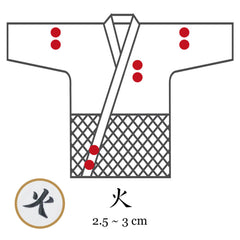
Embroideries Positions
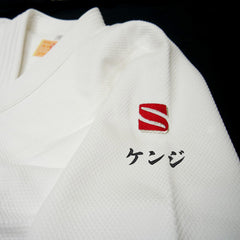
Sleeves
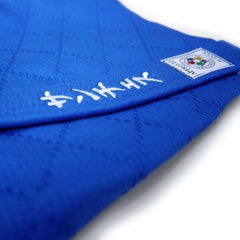
Border Tail

Pants
Obi (Belt) Embroidery
For belt embroideries, you can choose between non-integrated and integrated embroidery embroideries.
An "integrated" embroidery means embroidered realized on the outer surface before the manufacture of the belt and before the lines of stitching on the belt are added. This implies that these stitches are sewn onto and through the embroidery, leading to very resistant and durable embroideries, invisible on the reverse side of the belt. It is not recommended for grade lines embroidery as this process deform long straight embroidery lines. As this is a custom made product, manufacturing takes usually about 3 weeks.
"Non-integrated" embroideries are added after the fabrication of the belt. This means that the back side of the embroidery is visible on the reverse side of the belt. This type of embroidery is faster and easier to achieve (made within 3 business days) than integrated embroideries and therefore charged less. Non-integrated embroideries can be made on all belts, white or black, except on the JOGS model which is too thick to achieve good quality embroidery.
- Position 1 (label end, logo): position usually chosen for name embroidery.
- Position 2 (blank end, without logo / IJF logo): position usually chosen for Dojo names or grade embroidery.
- Integrated embroideries are offered only on black belts and the "Gyoshotai" font is not available for integrated embroideries.
- For non-integrated embroidery the golden and silver embroidery thread are for quality related reasons not shiny.
- Traditionally, belt embroideries are vertically. (Only exception: Names and words in English cursive lettering).
- English capital letters are usually vertical (horizontal possible).
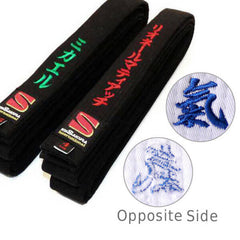
Non-integrated Embroidery

Integrated Embroidery
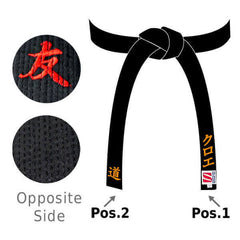
Name Embroidery
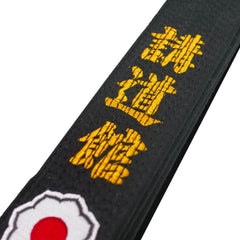
Dojo Name
Other Spots or Products
We offer as an option, direclty on each product page, embroideries on name plates for weapon bags, as well as name embroidery on sashiko (carry bags). Some other customizations might be offer for products on which embroideries are popuplar.
Upon request, embroideries are possible at positions not listed in the embroidery customization options, or even different products. Please contact us prior to placing your order for further details.
Transcriptions of Names & Japanese Embroidery
The KuSakuraShop team translates your name into Japanese. Names can be transcribed in several ways, depending on which syllable is emphasized and even more important in what language it is pronounced. (Example: The sound of the name "Michael" differs considerably if vocalized in English or any other language!) The translation service we offer uses official transcriptions whenever possible and common pronunciations of the name according to the country of delivery of the order. It is possible to add a comment for each embroidery to let us know the exact pronunciation of your name if it is not common. Furthermore, if you already have a name embroidery and want the same, send us a picture, using the file upload feature in each embroidery or engraving module. If no file was sent, we shall accept no complaint concerning the transcription done by our services.
Modern Japanese is written in a combination of three alphabets. The Katakana and the Hiragana that are phonetic alphabets and the Kanji, the semantic alphabet (the one best known in the West, derived from Chinese characters).
Foreign words and names are commonly transcribed in Katakana only. That is what this alphabet is used for in modern Japanese and what we offer for translations free of charge. And because Japanese is a syllabary language, initials do not exist. (Initials will be systematically embroidered and engraved in English.)
The second alphabet, the Hiragana is used for simple Japanese words and grammatical elements. It is relatively rare to embroider in this alphabet. (ex. Judo > じゅうどう)
The Kanji are used for most of the words with a semantic meaning (radicals of verbs, common names, proper names etc.). The word Judo, for example, is usually written in Kanji: 柔道.
Finally, there is a technique called Ateji to translate foreign names into Kanji. This allows thousands of possibilities, subject to interpretations and this technique, rarely used, is sometimes frowned upon in Japan. For these reasons, we do not offer this service.
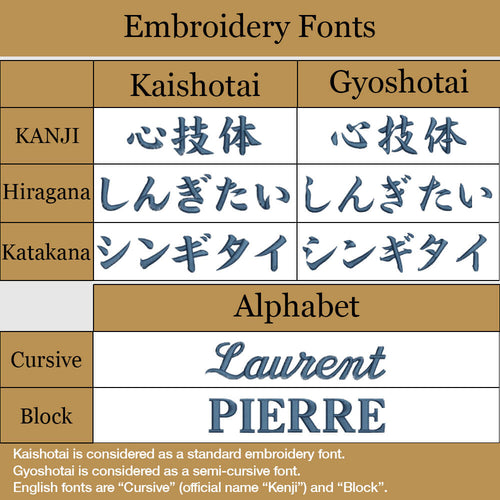
Embroidery in English
The reason why one has one's name embroidered is originally a way to express ones modesty, as you do not consider yourself as important enough to have your teacher and fellow practitioners remember your name. And because Westerners usually cannot read Japanese, it makes sense to opt for an English (roman letters) embroidery, unless you want to practice in Japan.

Embroidery in English
Embroidery of Japanese Words or Phrases
Let's say that you want to have an embroidery in Japanese but cannot provide the Japanese writing. If that is the case, you can simply fill in the embroidery content in English and choose a Japanese font. It helps if you add in the comment field further explanations if the content can have different meanings. E.g.: write "Judo" and choose a Japanese font and we will embroider "柔道 " (Judo). using Japanese Kanji.
For any other words or phrases it works alike. Enter the content in English and we will take care of the translation. E.g.: write "Tiger" in the content field, choose a Japanese font, and we will embroider "虎" (Tora/tiger) in Japanese. Again, if the word could be interpreted in different ways, please leave a comment.
Please note: If you already have an embroidery in Japanese, made by KuSakuraShop or any other store, or if you know how to write your name in Japanese - let us know. You can simply attach a picture to your order and we will use the same translation. For many names, there are several correct transcriptions and if no file was sent, we shall accept no complaint concerning the transcription done by our services. The same goes for any other word: The Japanese language has a huge vocabulary. For one word in English you could easily have several Japanese words describing (almost) the same. Attach a photo or give us the context to let us make the translation as accurate as possible. Particularly in the case of Dojo names: Although they are often in Japanese, the meaning (and hence the writing) might be unclear. (A bit like "nail" in English, which could refer to fingernail or the thin metal pieces.)
If you want to make sure that you get the translation you want contact us prior to placing your order.
Logo Embroideries
Even though this is generally not permitted in competition, certain Dojos wish to have their logo embroidered on the chest. We can of course offer this service, however, the charges varies depending on the complexity of the logo and the number of colors etc., you will need to contact us beforehand to discuss the content details and pricing.
Any requests for logos, ordered through the embroidery module without prior agreement will be ignored.
- Multiple colors: up to 4 colors from our embroidery color range
- Maximum size: 10 x 19 cm.
- Graphic design: our graphic designer has to transform the data (photo of the logo) into an embroidery file, charged $20.00-$100.00, depending on the complexity of the design. This fee has to be paid once, the embroidery file will be kept for 10 years.
- Embroidery: the costs for the embroidery depend on the size and complexity of the design and are roughly $20.00-$50.00 per embroidery.
- Delivery delay: 1 to 2 weeks.
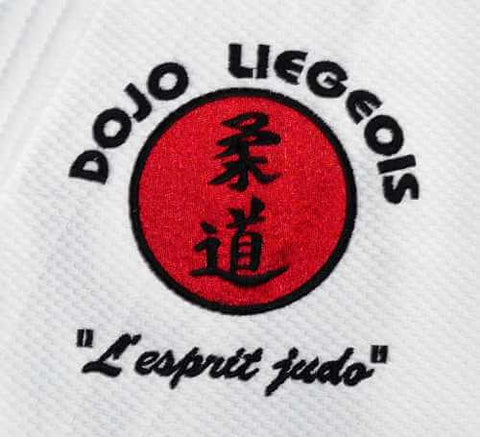
Logo Embroidery on the chest